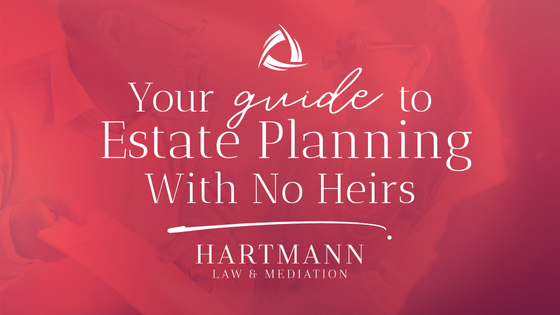One of the most significant estate planning factors is determining how you will distribute your assets to your friends and family. However, if you have no heirs, there could be a hitch in that plan.
Fortunately, estate planning does not solely depend on having heirs. You can still effectively plan without heirs.
So, if you are starting your estate planning process with no spouse, children, or other close heir, here is what you need to know.
Understand the Heir Hierarchy
Heirs do not solely need to be spouses, children, or siblings. The usual heir hierarchy will go down the line of surviving spouses, followed by children, and then grandchildren.
However, if none of those relatives can be identified, the heir hierarchy will trickle down to parents, grandparents, siblings, nieces, and nephews – even third cousins. If a relative can not be found, your estate would likely be handed off to the state if the proper preparations are not made.
If your estate is handed over to the state, you will no longer control where your assets are distributed. So, it is essential to understand the heir hierarchy and carefully consider who could survive you and where you wish your assets to go (or not go).
Choose a Power of Attorney
In an average estate plan, a financial power of attorney and a medical power of attorney are often titles given to close family or friends. However, if you do not have close heirs who can step up to take on these roles, it is essential to plan out who you want in charge of your financials and medical decisions when you can no longer be.
Oftentimes, individuals will choose a financial advisor or a trusted medical professional to take these titles. Having these planned out can ensure that if you become incapacitated, your decisions are your own. Additionally, it is essential to write your wishes in a detailed manner in your will and last documents to ensure everyone involved understands what you want.
Consider Alternative Heir Options
Rather than let the state decide where your assets will be distributed, you still have complete control over where they go after you pass – whether you have direct familiar heirs or not. You can utilize alternative heir options.
Charitable Organizations
In your will, you can dedicate your assets to a charitable organization of your choosing. This will ensure however much you wish to pass on or a certain percentage of your final assets is given to a charity.
Private Foundations
A foundation like this can allow you to pass down your assets in a way that is not regulated by the terms outlined in charitable donations. In either case, you can choose organizations that you have a deep connection with or have a stake in.
Friends
Friends are just as much as family to many of us. It is important to remember that they can be considered heirs, too. You simply need to write them into your estate plan accordingly.
Plan, Prepare, and Update
With no heirs, there is a chance that there is no one to know what you would want after you pass. It is essential (whether you have designated heirs or not) that you are extremely prepared in your estate plan for everything from your funeral to your long-term care plan.
The more detailed and specific you have your will and last documents, the better your wishes will be adhered to when the time comes. This will ensure that your medical and financial power of attorney knows what their roles are and that your assets and funeral are not taken over by those who do not know you.
Of course, life changes, and our wishes will, too. So, it is essential that your estate plan is consistently updated. You could choose to do this on a yearly basis or more frequently, depending on your circumstances. There is nothing wrong with being overprepared.
The best way to be overprepared when writing your estate plan is to partner with an estate planning attorney who can ensure that there are no possible holes in your estate plan. They can also ensure that your wishes are correctly and legally represented in your estate plan at every point.
Estate planning with no heirs does not mean you lose control of your assets. If you want to ensure your estate plan is solid, contact the team at Hartmann Law.

